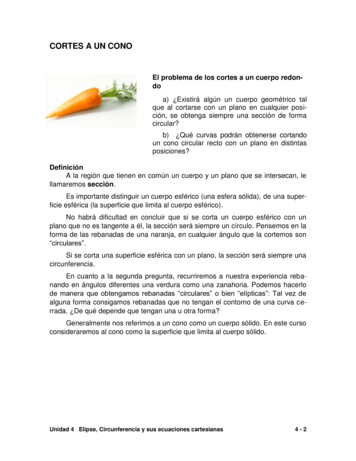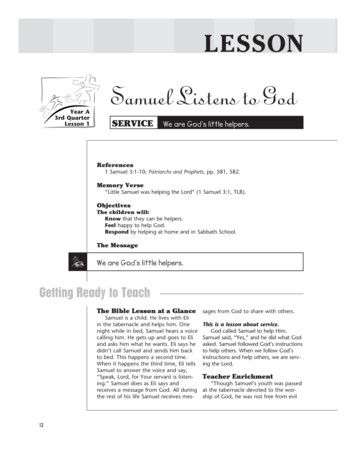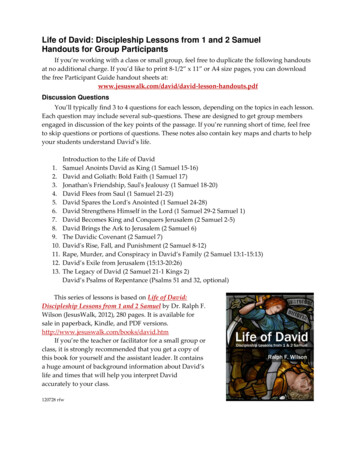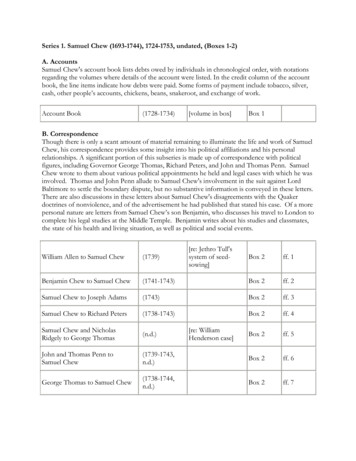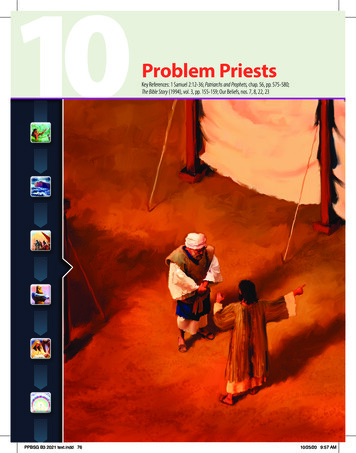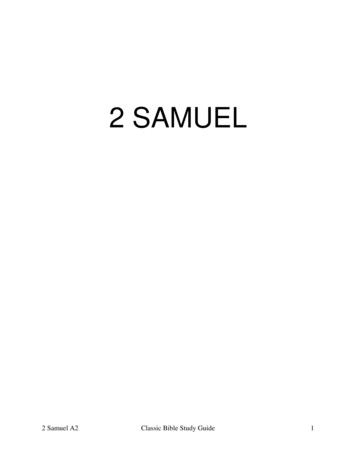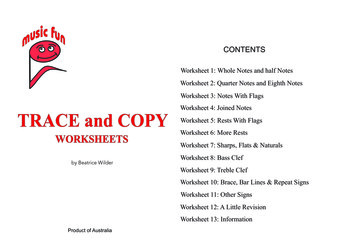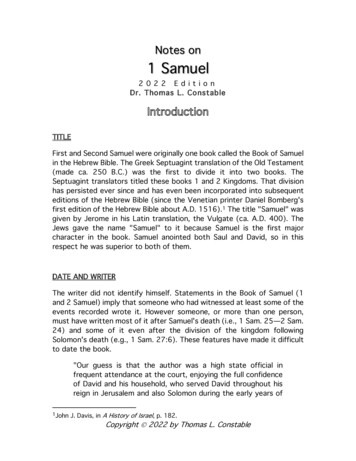
Transcription
Notes on1 Samuel2 0 2 2 E d i t i o nDr. Thomas L. ConstableTITLEFirst and Second Samuel were originally one book called the Book of Samuelin the Hebrew Bible. The Greek Septuagint translation of the Old Testament(made ca. 250 B.C.) was the first to divide it into two books. TheSeptuagint translators titled these books 1 and 2 Kingdoms. That divisionhas persisted ever since and has even been incorporated into subsequenteditions of the Hebrew Bible (since the Venetian printer Daniel Bomberg'sfirst edition of the Hebrew Bible about A.D. 1516).1 The title "Samuel" wasgiven by Jerome in his Latin translation, the Vulgate (ca. A.D. 400). TheJews gave the name "Samuel" to it because Samuel is the first majorcharacter in the book. Samuel anointed both Saul and David, so in thisrespect he was superior to both of them.DATE AND WRITERThe writer did not identify himself. Statements in the Book of Samuel (1and 2 Samuel) imply that someone who had witnessed at least some of theevents recorded wrote it. However someone, or more than one person,must have written most of it after Samuel's death (i.e., 1 Sam. 25—2 Sam.24) and some of it even after the division of the kingdom followingSolomon's death (e.g., 1 Sam. 27:6). These features have made it difficultto date the book."Our guess is that the author was a high state official infrequent attendance at the court, enjoying the full confidenceof David and his household, who served David throughout hisreign in Jerusalem and also Solomon during the early years of1JohnJ. Davis, in A History of Israel, p. 182.Copyright Ó 2022 by Thomas L. Constable
Dr. Constable's Notes on 1 Samuel22022 Editionhis reign, and whose duties may have been connected withliterary work."1Most conservative scholars prefer the view that Samuel may have writtenor been responsible for noting the record of earlier events in the book (chs.1—24). Then some unidentifiable writer or writers put it in its final formlater, perhaps soon after Solomon's death.2 Critical scholars tend to believeit was the result of much more piecing together, and some of them dateits final form as late as 500 B.C.3 The Babylonian Talmud (a Jewishcommentary dating from about A.D. 500) attributed authorship of 1Samuel 1—24 to the prophet Samuel, and the rest to Nathan and Gad (cf.1 Chron. 29:29).4 It is unlikely that Samuel wrote both books.5 Oneconservative estimate of the final date of composition is about 960 B.C.6Another guess is near 920 or 900 B.C.7SCOPEThe Book of Samuel covers the period of Israel's history bracketed bySamuel's conception and the end of David's reign. David turned thekingdom over to Solomon in 971 B.C.8 David reigned for 40 and one-halfyears (2 Sam. 2:11; 5:5). This means he came to power in 1011 B.C. Saulalso reigned for 40 years (Acts 13:21) so he became king in 1051 B.C. Wecan estimate the date of Samuel's birth fairly certainly, on the basis ofchronological references in the text, to have been about 1121 B.C.9 Thus1M.H. Segal, "The Composition of the Books of Samuel," Jewish Quarterly Review 55(1964-65):334.2See Brian N. Peterson, "The Authorship of Samuel: The Deuteronomist 70 Years afterNoth," Bibliotheca Sacra 172:688 (October-December 2015):416-32, who suggestedthat Abiathar the priest did this.3For a refutation of this view, see Gleason L. Archer Jr., A Survey of Old TestamentIntroduction, pp. 284-85.4Baba Bathra 14b, 15a.5See David M. Howard Jr., An Introduction to the Old Testament Historical Books, pp. 14243.6Eugene H. Merrill, "1 Samuel," in The Old Testament Explorer, p. 204.7Roland K. Harrison, Introduction to the Old Testament, p. 709.8See Edwin R. Thiele, The Mysterious Numbers of the Hebrew Kings, pp. 51-52.9See Eugene H. Merrill, Kingdom of Priests, pp. 149-50.
2022 EditionDr. Constable's Notes on 1 Samuel3the Book of Samuel spans the years 1121-971 B.C., or about 150 years ofhistory.The first part of 1 Samuel overlaps historically with the end of the JudgesPeriod that we find recorded in the Book of Judges. Josephus wrote:"Now after the death of Samson, Eli the high-priest wasgovernor of the Israelites."1Apparently Samson was born just a few years before Samuel. Samson's 20year judgeship evidently began shortly before the battle of Aphek (1104B.C.) at which time Eli died (1 Sam. 4:18).2 It ended not many years beforethe battle of Mizpah (1084 B.C.) when the Philistine domination of Israelceased temporarily (1 Sam. 7:13). Samuel's ministry, therefore, probablyran concurrent with that of Samson until Samson died. Saul began to reignabout 35 years after Samson died (i.e., 1051 B.C.). Samuel evidently livedabout 30 years after that.3OLD TESTAMENT HISTORYEventsBiblical ReferencesCreation to Israel's move toEgyptGenesis 1—50The ExodusExodus 1—18Israel at Mt. SinaiExodus 19—Numbers 10The Wilderness WanderingsNumbers 11—21Israel on the Plains of MoabNumbers 22—Joshua 21FlaviusJosephus, Antiquities of the Jews, 5:9:1. Josephus' statements are not always inharmony with the biblical text and reflect a certain element of Jewish tradition that wascommon when he wrote, i.e., in the first century A.D.2Leon J. Wood, Israel's United Monarchy, p. 23, wrote that the battle of Aphek happenedabout 1075 B.C. Though Wood is helpful in many respects, I do not think his dates are asaccurate as those of Merrill and Thiele.3Merrill, Kingdom of , pp. 149-50.
Dr. Constable's Notes on 1 Samuel42022 EditionThe Conquest and Division ofCanaanJoshua 3—24The Amphictyony (rule byjudges)Judges 1—1 Samuel 7The Reign of Saul1 Samuel 8—31; 1 Chronicles 10The Reign of David2 Samuel 1—24; 1 Chronicles 11—29The Reign of Solomon1 Kings 1—11; 2 Chronicles 1—9The Divided Monarchy1 Kings 12—2 Kings 17; 2 Chronicles10—31The Surviving Kingdom of Juda2 Kings 18—25; 2 Chronicles 32-36The Return under ZerubbabelEzra 1—6The Return under EzraEzra 7—10The Return under NehemiahNehemiah 1—13PURPOSEA main purpose of the Book of Samuel seems to have been to record theestablishment of kingship in Israel and to explain its theological significance.It deals with the Israelites' initial request for a king, the establishment ofthat king (Saul), and the tragic results of that king's reign. It then explainsthe consolidation of power under a second king (David), God's promises tohim, and his decline in his later years. The climax of the book comes in 2Samuel 7, where God promises David an everlasting dynasty. The writer (orwriters) clearly wanted to legitimatize the Davidic monarchy and dynasty.Whether and how the monarchy should be established are main subjects of1 Samuel, and the question of who should be Israel's king dominates muchof 2 Samuel.1As with all the historical narratives of the Old Testament, the Holy Spirit'spurpose in giving us the books of 1 and 2 Samuel was not just to recordevents that transpired. It was primarily to teach spiritual lessons to the1Howard,pp. 141, 146-47.
2022 EditionDr. Constable's Notes on 1 Samuel5original readers, and to readers of all time, by revealing the causes andeffects of various human responses to God's grace.1 God guided theinspired writers of Scripture to teach theology as well as to record history.This is clear in all the so-called historical books of both Testaments. We cansee this as we examine the reasons God selected the particular events andfacts that He recorded, through the biblical writers, for inclusion out of themass of possible data that He could have set forth.Scholars have disputed what it was that the writer chose to emphasizeprimarily in the Books of Samuel. Some have felt his unifying purpose wasto demonstrate the sovereignty of God.2 Some believe it was to show thatGod provides leadership for His people.3 Others have seen the purpose assomething else. I believe those who see the record of what happens toindividuals and nations, when they trust and obey God's Word or fail to doso, have identified the primary purpose.4For the Israelites, their commitment to obey the Mosaic Covenant out oftrust in God, and gratitude for His calling them to receive His grace, wouldresult in God blessing them (Deut. 28:1-14). However if they despised Hisgrace and departed from His will, as expressed for them in the MosaicCovenant, He would curse them (Deut. 28:15-68). Moses had explainedGod's "blessing" in Deuteronomy. It included fertility for the Israelitespersonally as well as for their herds and crops, and it included the ability todefeat their neighbor enemies and to enjoy peace and prosperity (rest) inthe Promised Land. It also included other material and social advantages,as well as the enjoyment of an intimate spiritual relationship with God.God's "curse," on the other hand, would be barrenness, defeat, oppression,and many other undesirable conditions.In Samuel we have a record of how commitment to the will of God resultsin blessing for individuals, groups of individuals, and whole nations. Thiscommitment should arise out of an appreciation for God's initiative inreaching out to undeserving sinners in grace. We also see how disregard1SeeSteven D. Mathewson, "Guidelines for Understanding and Proclaiming Old TestamentNarratives," Bibliotheca Sacra 154:616 (October-December 1997):410-35, for help inpreaching narrative portions of the Old Testament.2E.g., Ludwig Kohler, Old Testament Theology, p. 94.3Stanley D. Tucker, "The Theology of the Book of Samuel: A Study Of God's Humiliationor Exaltation of Leaders," Biblical Viewpoint 12:2 (1978):152; and David F. Payne, I & IISamuel, p. 5.4E.g., Walther Eichrodt, Theology of the Old Testament, 1:26.
Dr. Constable's Notes on 1 Samuel62022 Editionfor God's Word, because of a failure to appreciate God's grace, inevitablyleads to blasting, a curse from God. These lessons are not new; the Booksof Samuel are not emphasizing these things for the first time in Scripture.The Book of Joshua is a positive lesson that people who trust and obeyGod succeed and even accomplish supernatural feats and prosper. TheBook of Judges gives the other side of that coin: People who disregard Godfail, become unproductive, suffer defeat, and sometimes die prematurely.The Books of Samuel continue the emphasis begun in Genesis and Exodusthat Deuteronomy clarified, namely, that people's response to God's gracedetermines their destiny.GENREThe Books of Samuel are mainly narrative (stories) with some poeticsections interspersed. The main genre (type of literature) is theologicalhistory."No book of the Bible has been the object of such intenseinterest to literary analysts as has Samuel."1THEMES AND CHARACTERISTICSLongman and Dillard have identified several major themes in 1 and 2Samuel, including the reversal of fortune, David as king, David as a man,and the LORD's anointed. To these one could add: prayer, the rise of Israel'skingdom, and the increasing role of the prophet in Israel.2 David Firthidentified the central themes as: the reign of God, kingship, and propheticauthority.3 Some of the characteristic compositional techniques include:the repetition of key words, irony, and repetition.4 Three importanttheological concerns of Deuteronomy play prominent roles in these books:the anticipation of a king for Israel, the anticipation of rest for Israel, and1TremperLongman III and Raymond B. Dillard, An Introduction to the Old Testament, p.158.2J. Vernon McGee, Thru the Bible with J. Vernon McGee, 2:121.3David G. Firth, 1 & 2 Samuel, pp. 42-45.4Longman and Dillard, pp. 159-61, 165.
2022 EditionDr. Constable's Notes on 1 Samuelthe d7punishmentforTEXTThere are more textual corruptions in the books of Samuel than in almostany other Old Testament book.2 The text has not been well preserved,though by comparing Samuel with Chronicles, we can arrive at what theoriginal text probably was. This is especially true with numbers.OUTLINEI.Eli and Samuel 1:1—4:1aA.The change from barrenness to fertility 1:1—2:101.2.B.The contrast between Samuel and Eli's sons 2:11-361.2.3.4.C.1Ibid.,Eli's sons' wickedness 2:11-17Hannah's godly influence on Samuel and its effect 2:1821Eli's lack of influence on his sons and its effect 2:22-26The oracle against Eli's house 2:27-36God's first revelation to Samuel 3:1—4:1a1.2.II.Hannah's deliverance ch. 1Hannah's song 2:1-10Samuel's call 3:1-18Samuel's ministry 3:19—4:1aThe history of the ark of the covenant 4:1b—7:1pp. 163-64. Robert B. Chisholm Jr., 1 & 2 Samuel, has provided what he believes isthe "big idea" and some theological themes for each major section of the text that aredesigned to help modern Bible teachers and preachers identify the timeless lesson of thesebooks.2Gleason L. Archer, Encyclopedia of Bible Difficulties, p. 169.
Dr. Constable's Notes on 1 Samuel8A.The capture of the ark 4:1b-221.2.3.B.C.The plan to end God's judgment 6:1-9The return of the ark to Beth-shemesh 6:10-18The removal of the ark to Kiriath-jearim 6:19—7:1Samuel and Saul 7:2—15:35A.Samuel's ministry as Israel's judge 7:2-171.2.3.B.C.Samuel's spiritual leadership 7:2-4National repentance and deliverance 7:5-14Samuel's regular ministry 7:15-17Kingship given to Saul chs. 8—121.2.3.4.5.The demand for a king ch. 8The anointing of Saul 9:1—10:16The choice of Saul by lot 10:17-27Saul's effective leadership in battle 11:1-11The confirmation of Saul as king 11:12—12:25Kingship removed from Saul chs. 13—151.2.3.4.5.IV.The battle of Aphek 4:1b-11The response of Eli 4:12-18The response of Phinehas' wife 4:19-22Pagan fertility foiled by God ch. 5The ark returned to Israel by God 6:1—7:11.2.3.III.2022 EditionSaul's disobedience at Gilgal 13:1-15Saul's struggle against the Philistines 13:16—14:23Saul's cursing of Jonathan 14:24-46Saul's limited effectiveness in battle 14:47-52Yahweh's final rejection of Saul ch. 15Saul and David chs. 16—31A.David's rise as the new anointed 16:1—19:171.2.God's selection of David for kingship ch. 16The reason for God's selection of David ch. 17
2022 Edition3.B.9The results of God's selection of David 18:1—19:17David driven out by Saul 19:18—20:421.2.C.Dr. Constable's Notes on 1 SamuelGod's deliverance in Ramah 19:18-24Jonathan's advocacy for David ch. 20David in exile chs. 21—311.2.3.4.David's initial movements chs. 21—22Saul's pursuit of David ch. 23David's goodness to two fools chs. 24—26The end of Saul's reign chs. 27—31(Continued in notes on 2 Samuel)MESSAGEFirst and Second Samuel are really one story. The translators divided theminto two books for convenience, not because of subject matter. This is alsotrue of Kings and Chronicles.First Samuel records Israel's transition from amphictyony (leadership byjudges) to monarchy (leadership by kings). The key passage that explainsthis transition is 8:4-7. Two statements from this passage are especiallysignificant:The human desire that produced the transition expressed itself in verse 5:"Now appoint us a king to judge us like all the nations."1 God had broughtIsrael into existence as a nation to be unlike all the nations (Exod. 19:5-6).The essence of its uniqueness was Yahweh's rule over it as King. Godwanted Israel to be a demonstration for all the world to see how glorious itcan be to live under the gracious sovereign of God.The real meaning of the people's request comes out in verse 7: " theyhave rejected Me from being King over them." During the period of thejudges, religious apostasy spread and characterized Israel. The peoplerefused to obey their heavenly King. It is this attitude that finds expression1Quotationsfrom the English Bible in these notes are from the NASB (The New AmericanStandard Bible), 2020 ed., unless otherwise indicated.
10Dr. Constable's Notes on 1 Samuel2022 Editionin verse 5. This is the essence of sin, and it results in idolatry. Every idol isa witness to man's need of God. When people reject the true God, theymust put something in His place to meet that need. Human beings musthave a god. That is just how God made us.Israel turned from Yahweh (the LORD) as her King in 1 Samuel. Shedemanded a king like the other nations. This book shows the immediateeffects of that demand.One of the great revelations of 1 Samuel is how, from the human viewpoint,God adapts in order to continue His reign. He adapted from using judges tolead His people to using a king to lead them.The statement that "God adapts to continue His reign," may appear tocontradict 8:7, but it does not. The people rejected Yahweh, but they didnot dethrone Him. The first act is possible, but the second is not. This is amajor lesson of 1 Samuel. The great revelation of this book is not primarilyits three central figures: Samuel, Saul, and David. It is Yahweh, reigning byadapting to human situations, and moving—surely and steadily—towardthe fulfillment of His purposes. In spite of disobedience or obedience, failureor success, rebellious or loyal people, the reign of God moves on. We seethis great lesson in the history of 1 Samuel's three central figures: Samuel,Saul, and David.The writer introduced Samuel's story with his mother Hannah's experiencewith God. Hannah was a great woman of faith who lived in the JudgesPeriod. Her faith became God's foothold for Israel's advance. Her songreveals a profound appreciation for Yahweh as the God who reigns over all(2:6-8, 10).Samuel was a prophet. In one sense, he was the first of the prophets (Acts3:24). Of course, Moses was a prophet, and so was Abraham, but Samuelwas the first of the order of prophets who mediated between God and theIsraelites during the monarchy. The kings of Israel and Judah were never"mediators" between God and the people—in the sense of speaking for Godto the people. When the Israelites rejected Yahweh as their king, Hewithdrew from close communion and intimate fellowship with them. Henever recognized their kings as standing between Himself and them tomediate His Word to the people. He chose their kings for them. He allowedtheir desire for a human king to work itself out in ultimate disaster throughthe years that followed. Yet He never spoke to the people through the king.
2022 EditionDr. Constable's Notes on 1 Samuel11He always spoke to them through the prophets. Samuel was the first ofthese. David, of course, was both a king and a prophet. The role of thekings was to govern the people. The role of the prophets was to conveyGod's messages to them.With Samuel, the office of prophet in Israel emerges as that of Yahweh'sauthoritative representative to His people. Samuel became the kingmaker,finding and anointing both Saul and David. From Samuel on, when God hada message for the people, it normally did not come directly to the king, butto the king and the people through a prophet. The prophet's office wasalways superior to that of Israel's kings. Christians have the privilege ofspeaking for God to our generation. We have a high calling similar to thatof Israel's prophets.When Israel rejected Yahweh as her king, God chose Samuel, the child of awoman's simple faith, trained him in the tabernacle, and called him whenhe was only a boy. Then He gave him a message to deliver, and sent himfirst to anoint Saul as the king after the people's own heart, and later Davidas the king after God's own heart. The prophets became God's mediators,His messengers, and the interpreters of His will.Thus Yahweh reigned, though He adapted His methods of ruling by raisingup the prophets. He called Samuel as the first of these mediators. Duringthe monarchy, God provided guidance through two offices rather thanthrough one, which He had done previously. The kings provided politicalleadership, and the prophets gave the people spiritual leadership. God hadpreviously provided both types of leadership through single individuals,namely: Moses, Joshua, and the judges.Saul's story is one of the most tragic in Scripture. It is unusually fascinatingand has tremendous power in its appeal to our lives, because mostChristians can identify easily with Saul. When God placed Saul on Israel'sthrone, He answered the prayer of His rebellious people in 8:5: "He gavethem their request, but sent a wasting disease among them" (Ps. 106:15).Saul was a revelation to the Israelites of what the possession of a king likethe nations really meant. He had unusual physical strength, but he wasweak spiritually. He was humble at first, but he became proud. Havingrejected Yahweh's authority over him he became moody and eventuallyturned into a madman. He paid little attention to the prophet Samuel, and
12Dr. Constable's Notes on 1 Samuel2022 Editioneventually sought guidance from a witch. Instead of subduing Israel'senemies, he destroyed himself by committing suicide.Saul's reign was also a disaster. At the beginning of his reign, Israel wasvirtually without a leader. At its end, it was under the control of an enemyneighbor: the Philistines. Saul was never able to expand the borders ofIsrael, because he never was strong enough to dominate his enemyneighbors. David, on the other hand, did both of these things. At the endof Saul's reign, Israel had almost destroyed itself through its wars with thePhilistines.In contrast to Saul's story, David's story is one of the most glorious inScripture. After Saul, God gave His people another king, but this time hewas a man after God's own heart.God prepared David for the throne by putting him through training as ashepherd in the fields, a courtier in the palace, and an "outlaw" in exile. (By"outlaw" I do not mean that David was lawless but that King Saul could notcontrol him.) His shepherd training prepared him to care for and protectthe Israelites under his charge. His courtier experience prepared him to dealwith governmental leaders in other nations. His "outlaw" years perfectedthe disciplines that enabled him to become a strong ruler. These disciplinesincluded relying on God in every situation, practicing self-restraint, andleading his people.In all of David's training, God was reigning, moving forward to the fulfillmentof His plans and purposes. God had previously done this by making the childof faith, Samuel, His prophet. He had also done this by making outwardlypromising Saul a revelation to the nation of her sins in turning away fromHimself.The second great revelation of this book is that people cooperate or fail tocooperate with God by either being loyal or by being disloyal to Him.Regardless of people's response to Him, Yahweh accomplishes His plansand purposes through them.In Samuel's case, he had opportunities to glorify God—because of hisparentage, his call by God, and his appointment as God's prophet. Heresponded obediently, with loyalty to God. Consequently, God's messagesgot delivered, and God's work moved ahead. Samuel was an instrument ofblessing to Israel.
2022 EditionDr. Constable's Notes on 1 Samuel13In Saul's case, he had opportunities to glorify God too. His opportunitiescame in his call by God, his anointing by Samuel, his friendship with Samuel,his popularity with the people, and his divinely given personal abilities. Buthe responded disobediently, with disloyalty to God, as seen in his vacillatingbehavior and self-will. Consequently, he failed as a king, and he died underthe judgment of God. His life was a failure in the eyes of God and theIsraelites.In David's case, his opportunities were his call, his anointing, his preparationfor the throne, and his sufferings, which God used to refine him. Davidresponded obediently, with loyalty to God. Consequently, he became God'sinstrument of progress and blessing. He was a success.Each man had his opportunities, made his responses, and experienced theconsequences of his responses. Two obeyed, and one disobeyed. All threecooperated with God in fulfilling His ultimate purposes, either to his ownblessing or to his own blasting.As a result of these two major revelations, I would summarize the messageof 1 Samuel as follows: God will accomplish His purposes regardless ofpeople's personal responses to Him. However, people's responses to God'srevealed will determine their own success or failure in life, from God'sperspective.First Samuel teaches us the methods of the sovereign God. All territory iswithin God's jurisdiction, every person is under His control, and all eventsare in His hands. All of God's plans and purposes are moving towardaccomplishment. He makes use of all antagonistic facts and forces, as wellas all cooperative facts and forces. He also makes use of all the agentswhom He has chosen to use, regardless of their responses. Paul'scomments in 2 Timothy 2:20-21 are very much to the point here: God usesboth vessels unto honor and vessels unto dishonor.First Samuel also teaches us that God's ultimate victory is independent ofthe attitudes and actions of individuals and groups of people toward Him.Nevertheless, the ultimate destiny of individuals and groups of peopledepends on their attitudes and actions toward Him.Samuel was obedient, was God's instrument, and experienced distinction.Saul was disobedient, was God's instrument, and experienced destruction.David was obedient, was God's instrument, and experienced deliverance.
14Dr. Constable's Notes on 1 Samuel2022 EditionOur attitudes and actions do not determine God's ultimate victory, but theydo determine our ultimate destiny in this life and the next—not our eternalsalvation, but our rewards. God uses all people, loyal and rebellious, to bringHis ultimate purposes to fruition. However, we determine the outcome ofour lives by our attitudes and responses to Him. We see these principlesworking themselves out around us all the time.11Adapted58.from G. Campbell Morgan, Living Messages of the Books of the Bible, 1:1:147-
2022 EditionI.Dr. Constable's Notes on 1 Samuel15ELI AND SAMUEL 1:1—4:1AFirst Samuel begins by contrasting Israel's last two judges (Eli: a failure,and Samuel: a success) and then Israel's first two kings (Saul: a failure, andDavid: a success).Chronology of 1 & 2 Sam uel1 S am uelE LIb. 1202SAMSONSAMUELSAULJO N ATH A ND AV IDS O LO M O N2 S am ueld. 1104began judging1144Battle ofAphekb. ca. 1123began judgingca. 1105d. ca. 1085b. ca. 1121d. ca. 1021b. ca. 1091began reign1051b. ca. 1071d. 1011Battle ofMt. Gilboad. 1011b. 1041d. 971began reign1011b. ca. 991began reign971The first major section of Samuel sharply contrasts obedience anddisobedience to the will of God as God expressed that for Israel in theMosaic Covenant. This contrast is clear in all seven major sections of 1 and2 Samuel. The events in this section took place during Eli's 40-yearjudgeship (4:18; 1144-1104 B.C.).1 First Samuel overlaps Judgeschronologically.1SeeEugene H. Merrill, "Paul's Use of 'About 450 Years' in Acts 13:20," Bibliotheca Sacra(July-September 1981):247.
Dr. Constable's Notes on 1 Samuel162022 Edition" the first seven chapters, chs. 1—7, constitute a unifiedwhole, dealing with the transitional period from the end ofjudgeship to the new era of kingship."1A.THE CHANGE FROM BARRENNESS TO FERTILITY 1:1—2:10In the first subsection of the Eli Samuel story (1:1—2:10), we have thejoyful account of Samuel's miraculous birth and his mother's gratitude toGod for reversing her barrenness and giving her a son. The significance ofthis story is not only that it gives us the record of how Samuel was born,and that his mother was a godly woman. But it also shows how God, infaithfulness to His promise to bless those who put Him first (Deut. 28), didso even for a despised woman in Israel (cf. Rahab and Ruth). He broughtblessing to all Israel because of her faith.The birth narratives of Moses (Exod. 1—2) and Jesus (Luke 1—2) likewiseintroduce decisive periods in history. In Samuel's case (1 Sam. 1—2), thenew era of monarchy began with the birth of the kingmaker.1.Hannah's deliverance ch. 1"I Samuel 1 is presented as a conventional birth narrative whichmoves from barrenness to birth. Laid over that plot is a secondrhetorical strategy which moves from complaint tothanksgiving. With the use of this second strategy, the birthnarrative is transposed and becomes an intentional beginningpoint for the larger Samuel-Saul-David narrative. Hannah'sstory begins in utter helplessness (silence); it anticipatesIsrael's royal narrative which also begins in helplessness. AsHannah moves to voice (2,1-10), so Israel's narrative movesto power in the historical process. Both Hannah's future andIsrael's future begin in weakness and need, and move towardpower and well-being. The narrative of I Samuel 1 functions tointroduce the theological theme of 'cry-thanks' which appearsin the larger narrative in terms of Israelite precariousness andYahweh's powerful providence. Our chapter correspondscanonically to II Samuel 24 which portrays David in the end(like Hannah) as a needy, trusting suppliant. The two chapters,1DavidT. Tsumura, The First Book of Samuel, p. 103.
2022 EditionDr. Constable's Notes on 1 Samuel17witnesses to vulnerable faith, together bracket Israel's largerstory of power."1Sea ofChinnerethCENTRAL lohOF EPHRAIMRamahSalt SeaThe problem 1:1-2Samuel's parents lived near Ramathaim-zophim (lit. "two heights," or "twohills," elsewhere called "Ramah," e.g., v. 19, lit. "height"). This town was inEphraim, in central Canaan, about five miles north of Jerusalem. Perhaps1WalterBrueggemann, "I Samuel 1: A Sense of a Beginning," Zeitschrift für dieAlttestamentliche Wissenschaft 102:1 (1990):48.
Dr. Constable's Notes on 1 Samuel182022 Editionthe city stood on one of the two hills, with a high place of worship on theother.1"Perhaps the city's name proper was "Ramah" (also 1 Sam.2:11) and was sometimes called by its descriptive name,Ramathaim "Two Hills" "2There was also a Ramah in the territory of Benjamin, farther to the south(Judg. 19:13; et al.), and one in Naphtali, to the north (Josh. 19:29, 36).Samuel's father, Elkanah, was an Ephraimite by residence but a Levite bybirth (1 Chron. 6:33-38). Ramah was not one of the Levitical towns inEphraim. Elkanah's residence raises initial questio
editions of the Hebrew Bible (since the Venetian printer Daniel Bomberg's first edition of the Hebrew Bible about A.D. 1516).1 The title "Samuel" was given by Jerome in his Latin translation, the Vulgate (ca. A.D. 400). The Jews gave the name "Samuel" to it because
